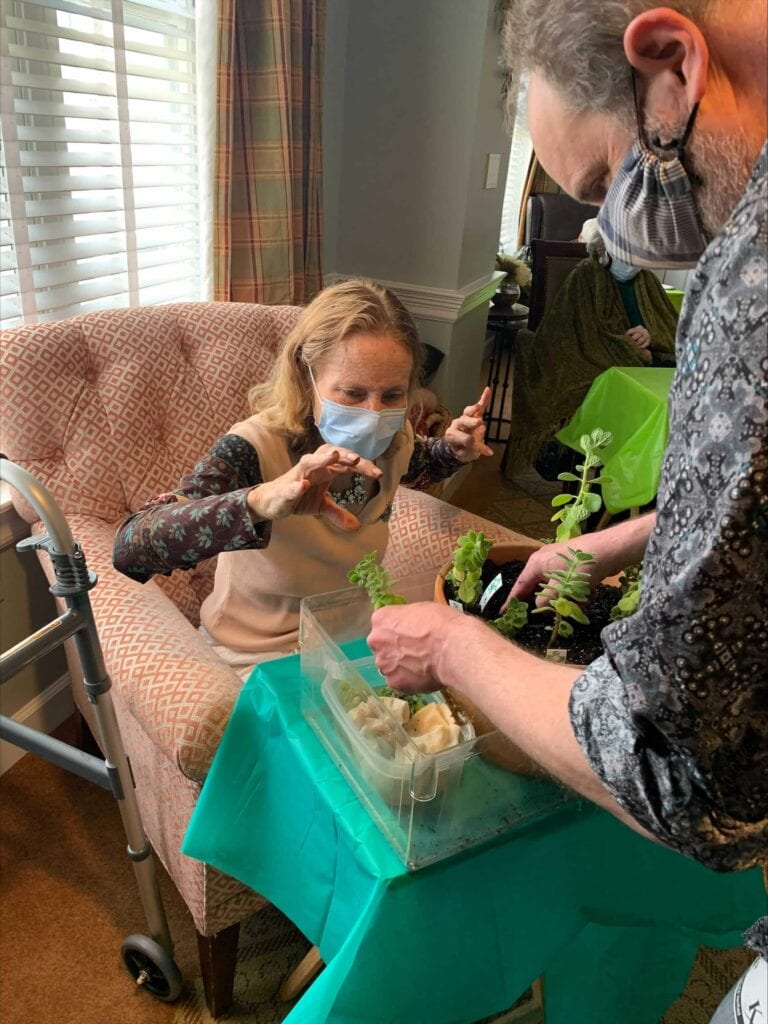Seniors living in an assisted living or memory care community can benefit from engaging in horticultural therapy, also called garden therapy.
Often, as seniors begin to lose their independence and need help with daily activities, there are fewer activities for them to participate in.
Maintaining a garden can give your loved one something to care for, which could help them feel calmer, happier, more independent, and in control.
With something to look forward to each day, your loved one may feel excited as they eagerly watch their flowers, plants, or herbs grow. It is a great accomplishment to create something from nothing and watch it bloom into something beautiful.
Horticultural therapy may even give your senior an excuse to get outdoors if they struggle to motivate themselves. This offers them more opportunities to soak up vitamins from the sun, get some fresh air, and live a healthier and more active life.
At The Kensington White Plains, our residents have the opportunity to use their green thumb! Residents each have indoor Tower Gardens to grow fresh vegetables that our dining team uses in their daily nutritious meals.
Each patio has a garden that residents also can maintain if they like, and there is an outdoor community garden for larger scale planting! They can also choose to participate in Gardening Club, along with life enrichment activities like flower arranging and garden walks.
What is horticultural therapy?
Seniors that participate in horticultural therapy use plants, flowers, and herbs, to engage in gardening activities that improve their health and wellbeing.
Using horticultural therapy techniques, seniors can regain or learn new skills.
These activities often require seniors to spend time outside digging, planting, pouring water, and prepping food. These tasks help seniors use the muscles in their brains and bodies, improving their overall health and wellness.
Studies have even shown that seniors who participate in gardening and get their hands into the soil come in contact with Mycobacterium, a friendly soil bacteria that boosts the immune system.
What are the best plants to use for horticultural therapy?
Before creating a therapeutic garden, you and your senior loved one may want to consider the type of plant or garden they would enjoy caring for.
All gardens are beautiful, soothing, and beneficial, so no specific plant is better than the next.

Some seniors enjoy fragrant plants with flowers such as roses, gardenias, and lilacs, while others prefer lavender, rosemary, lemon balm, and mint. These scents can produce tranquility and help seniors recall memories.
Edible plants and herbs are often some of the most enjoyable for seniors, as they can eat what they grow with their very own hands. Some great examples are tomatoes, strawberries, peppers, cucumbers, carrots, leafy greens, cilantro, basil, and thyme.
Geraniums, marigolds, snapdragons, angelonia, and tulips are popular for seasonal activities and gardens. Their vibrant colors and scents make them enjoyable to smell and look at.
Themed gardens are becoming increasingly popular as well. Your loved one may enjoy creating a fairy garden, rainbow garden, moon garden, or Japanese garden.
Gardening tasks double as occupational therapy
When seniors engage in horticultural therapy, they improve their functional abilities and skills in a way that is similar to occupational therapy.



Through gardening activities, seniors strengthen their fine motor skills, gross motor skills, movements, coordination, and balance, while building endurance and increasing their strength.
Gardening task ideas include:
- Watering plants
- Picking flowers
- Carrying water and tools
- Planting
- Weeding
- Potting
- Painting pots
- Picking up small seeds
- Raking
- Digging holes
- Standing, kneeling, crouching
- Putting on gardening gloves
- Planning a new garden

All of these activities require a senior to use skills that they may not have used in a while or to learn new skills.
For seniors with memory diseases such as Alzheimer’s disease or dementia, horticultural therapy can help them remember people and things from their past, maintain cognitive and motor skills longer, and help them find calmness.
What are the benefits of horticultural therapy programs for seniors?
Seniors will benefit in many ways when they join a horticultural therapy program. At The Kensington White Plains, we incorporate wellness and programs like this into the daily life enrichment schedule.
These programs promote health and wellness through calming experiences and activities that use a wide variety of plants.
Mental and emotional benefits
- Reduces depression and anxiety
- Improves memory
- Increases confidence
- Sense of purpose
- Attention and focus
- Language skills
- Ability to take on new tasks
- Improve social skills
- Quality of life
Physiological and physical benefits
- Lower blood pressure
- Lower heart rate and heart health
- Paid reduction
- Lung health
- Lowers cortisol, the stress hormone
- Boosts immune system
- Prevents obesity
- Strengthens bones and muscles
- Reduces the risk of some cancers and diabetes
- Extends lifespan
Healthier living at The Kensington White Plains
We are an enhanced assisted living and memory care community that stands by Our Promise to love and care for your family as we do our own.

Our safe and cozy homes offer your senior loved one a comfortable space to age in place with dignity and quality of life.
With on-site nurses, high acuity care, medication and injection administration, rehabilitation, life-enrichment activities, and the healthiest dining services, your loved one can receive the highest level of care.
Reach out to us today to learn more about our memory care neighborhoods, assisted living community, and how we incorporate horticultural therapy and wellness programs into our resident’s daily routine.